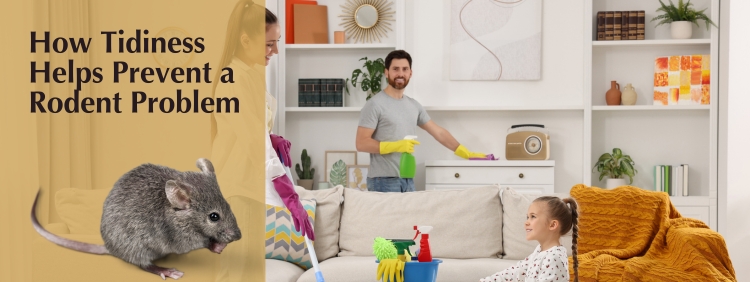 When rodents decide to turn your cozy home into their own personal playground, everyone's sanity and health are at risk. Your food can be contaminated, damage to your home’s infrastructure can occur, and the spread of diseases is highly likely. But, amid all your rodent control countermeasures, have you ever considered how maintaining a tidy environment could be your first line of defence? This article is here to shed some light on precisely that subject, offering practical and easily implementable strategies to keep those mischievous intruders at bay.
Keeping your home neat and organized does not just offer psychological benefits or aesthetic appeal; it has significant implications in the ongoing war against rodents.
When rodents decide to turn your cozy home into their own personal playground, everyone's sanity and health are at risk. Your food can be contaminated, damage to your home’s infrastructure can occur, and the spread of diseases is highly likely. But, amid all your rodent control countermeasures, have you ever considered how maintaining a tidy environment could be your first line of defence? This article is here to shed some light on precisely that subject, offering practical and easily implementable strategies to keep those mischievous intruders at bay.
Keeping your home neat and organized does not just offer psychological benefits or aesthetic appeal; it has significant implications in the ongoing war against rodents.
Organizing Your Space to Keep Rodents Away
Think of your house as a puzzle. Every piece, when placed in its correct spot, creates a cohesive picture. The same principle applies to your tidiness routine for effective pest control. Let's break down how organizing space not only enhances the beauty of your home but also deters rodents. First off, rodents are great at hide-and-seek. They love to find obscure, cluttered areas that can serve as their lair. A pile of boxes in your garage, a laundry heap in the basement, or even a messy pantry can become a five-star hotel for these unwanted guests. Maintaining orderliness decreases the chances of nesting and gnawing, significantly reducing the risk of infestation. Think about your messy closet or the basement filled with old items you seldom touch. Rodents are opportunistic creatures. They are experts at exploiting such disorderly spaces that humans tend to neglect. By organizing your home space, you effectively eliminate these potential hideouts, making it less hospitable for rats and mice. Next, consider this: storage is key in organizing, particularly for items that are not frequently used. Implementing proper storage methods by using containers or cabinets can do wonders in maintaining tidiness and preventing infiltrations. Remember, your main goal is to eliminate potential nesting sites, and safely storing items helps attain just that.- A place for everything: Ensure that each item in your home has a designated place, be it clothing, kitchen utensils, tools, or accessories.
- Store things off the floor: Keeping items off the floor makes it harder for rodents to reach and also allows you to spot any potential activity.
- Regular cleanups: Keep clutter in check by regularly organizing your spaces. Weekly cleans can help keep things in order and discourage pests.
The Connection Between Food Storage and Rodent Control
When it comes to achieving effective rodent control, your food storage practices play an undeniable role. And yes, you guessed it right - better food storage leads to fewer critters. But how so, and what can you do about it? Let's dive into this matter.Why Tidy Food Storage Matters
Apparently harmless, a loaf of bread casually left on the counter or an open pack of cookies might as well be a VIP invitation to a rodent party. They are called pests for a reason, and their keen noses are intensely attracted by the alluring smell of food. This fundamental survival instinct is what often leads them straight into your home. Fortunately, being mindful of how you store your food can change the game. Doing this not only reduces the chances of an invasion but also makes them less likely to survive if an invasion does occur. Good food storage practices deprive them of the very resources they need to live and reproduce, thereby controlling their numbers.Food Storage Tips
If you're hoping to stay one step ahead of critters in their hunt for nourishment, then your food storage strategies are indeed crucial. Let’s take a look at some practical tips you can adopt to create an impenetrable fortress for your food, sure to confound even the most innovative of infiltrators.- Use Airtight Containers: Glass or heavy-duty plastic containers with a tight seal are your best bet. Not only can these prevent the smell of food from attracting rodents, but they're also hard for these pests to gnaw through.
- Store Food off the Ground: Elevating your food supplies eliminates the ease with which they can access it. Think high shelves or hanging baskets.
- Keep Surfaces Clean: After preparing or eating food, ensure you wipe down surfaces thoroughly. Crumbs and scraps might not seem important, but they're a feast to a leaping rodent.
The Impact of Proper Waste Management
Waste management isn't just about taking out the trash. It's an essential component of effective pest control. Whether it's leftover food or general clutter, improperly managed waste can quickly become a breeding ground for an array of pests.
Understanding the Role of Waste in Rodent Attraction
Rats and mice are attracted to areas where food sources and shelter are readily available. Given that waste often ticks both of these boxes, it's no surprise that these rodents find messy environments irresistible. By establishing habits of proper waste disposal, you'll be limiting their food sources and making your space less hospitable to them.Effective Waste Management Practices
Eradicating your rodent problem may require a little more effort than a thorough spring cleaning. But incorporating these simple waste management strategies in your routine can make all the difference:- Timely disposal of waste: Don't let your garbage pile up. Regularly disposing of your waste lessens the chances of an infestation.
- Use secure garbage bins: Rodents are sneaky creatures and can easily wriggle their way into garbage bins. Opt for pest-proof bins with tight-fitting lids.
- Waste segregation: Separate your organic waste from your inorganic. Keep food scraps in an airtight container and dispose of it daily.

